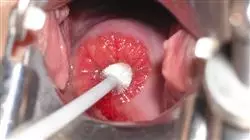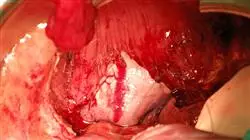University certificate
The world's largest faculty of medicine”
Introduction to the Program
New circumstances in Gynecologic Oncology have pushed us to introduce new educational programs that meet the real needs of experienced professionals, so that they can incorporate new advances into their daily practice"

Gynecologic Oncology has undergone remarkable development in the past few years. Both specialties, gynecology and oncology, face increasingly complex challenges associated with the development of diagnostic and therapeutic techniques, as well as technological and informatics innovations and the use of biomaterials and new, much more conservative surgical procedures.
These developments force specialists to constantly update there knowledge and understanding, by studying the available evidence and developing new skills. This allows them to keep up with technological and social changes to improve patient health.
The Professional master’s degree in Gynecologic Oncology allows the specialist to access this information in a practical way, without compromising on the science involved, adapting the process to their personal and professional needs.
This Professional master’s degree in Gynecologic Oncology contains the most complete and up-to-date scientific program on the market”
This Professional master’s degree in Gynecologic Oncology contains the most complete and up-to-date scientific program on the market. The most important features include:
- Development of more than 80 clinical cases, recorded with POV (Point Of View) systems from different angles, presented by experts in gynecology and other specialities. The graphic, schematic, and practical contents with which they are created, provide scientific and practical information on the disciplines that are essential for professional practice
- Presentation of practical workshops on procedures and techniques
- An algorithm-based interactive learning system for decision-making in the clinical situations presented throughout the course
- Action protocols and clinical practice guidelines, which cover the most important latest developments in this specialist area
- All of this will be complemented by theoretical lessons, questions to the expert, debate forums on controversial topics, and individual reflection assignments.
- With a special emphasis on evidence-based medicine and research methodologies in the surgical process
- Content that is accessible from any fixed or portable device with an Internet connection
This Professional master’s degree may be the best investment you can make when selecting a refresher program for two reasons: in addition to updating your knowledge in Gynecologic Oncology, you will obtain a Professional master’s degree from TECH Global University"
The teaching staff comprises a team of renowned health professionals who bring their professional experience to the program, in addition to recognized specialists belonging to leading scientific societies.
The multimedia content developed with the latest educational technology will provide the professional with situated and contextual learning, i.e., a simulated environment that will provide an immersive training program to train in real situations.
This program is designed around Problem-Based Learning, whereby the professional must try to solve the different professional practice situations that arise throughout the program. For this reason, you will be assisted by an innovative, interactive video system created by renowned and experienced experts in the field of gynecology and oncology with extensive teaching experience.
Increase your decision-making confidence by updating your knowledge through this Professional master’s degree"

mprove your medical-surgical practice in Gynecologic Oncology with this targeted program"
Why study at TECH?
TECH is the world’s largest online university. With an impressive catalog of more than 14,000 university programs available in 11 languages, it is positioned as a leader in employability, with a 99% job placement rate. In addition, it relies on an enormous faculty of more than 6,000 professors of the highest international renown.

Study at the world's largest online university and guarantee your professional success. The future starts at TECH”
The world’s best online university according to FORBES
The prestigious Forbes magazine, specialized in business and finance, has highlighted TECH as “the world's best online university” This is what they have recently stated in an article in their digital edition in which they echo the success story of this institution, “thanks to the academic offer it provides, the selection of its teaching staff, and an innovative learning method aimed at educating the professionals of the future”
A revolutionary study method, a cutting-edge faculty and a practical focus: the key to TECH's success.
The most complete study plans on the university scene
TECH offers the most complete study plans on the university scene, with syllabuses that cover fundamental concepts and, at the same time, the main scientific advances in their specific scientific areas. In addition, these programs are continuously being updated to guarantee students the academic vanguard and the most in-demand professional skills. In this way, the university's qualifications provide its graduates with a significant advantage to propel their careers to success.
TECH offers the most comprehensive and intensive study plans on the current university scene.
A world-class teaching staff
TECH's teaching staff is made up of more than 6,000 professors with the highest international recognition. Professors, researchers and top executives of multinational companies, including Isaiah Covington, performance coach of the Boston Celtics; Magda Romanska, principal investigator at Harvard MetaLAB; Ignacio Wistumba, chairman of the department of translational molecular pathology at MD Anderson Cancer Center; and D.W. Pine, creative director of TIME magazine, among others.
Internationally renowned experts, specialized in different branches of Health, Technology, Communication and Business, form part of the TECH faculty.
A unique learning method
TECH is the first university to use Relearning in all its programs. It is the best online learning methodology, accredited with international teaching quality certifications, provided by prestigious educational agencies. In addition, this disruptive educational model is complemented with the “Case Method”, thereby setting up a unique online teaching strategy. Innovative teaching resources are also implemented, including detailed videos, infographics and interactive summaries.
TECH combines Relearning and the Case Method in all its university programs to guarantee excellent theoretical and practical learning, studying whenever and wherever you want.
The world's largest online university
TECH is the world’s largest online university. We are the largest educational institution, with the best and widest online educational catalog, one hundred percent online and covering the vast majority of areas of knowledge. We offer a large selection of our own degrees and accredited online undergraduate and postgraduate degrees. In total, more than 14,000 university degrees, in eleven different languages, make us the largest educational largest in the world.
TECH has the world's most extensive catalog of academic and official programs, available in more than 11 languages.
Google Premier Partner
The American technology giant has awarded TECH the Google Google Premier Partner badge. This award, which is only available to 3% of the world's companies, highlights the efficient, flexible and tailored experience that this university provides to students. The recognition as a Google Premier Partner not only accredits the maximum rigor, performance and investment in TECH's digital infrastructures, but also places this university as one of the world's leading technology companies.
Google has positioned TECH in the top 3% of the world's most important technology companies by awarding it its Google Premier Partner badge.
The official online university of the NBA
TECH is the official online university of the NBA. Thanks to our agreement with the biggest league in basketball, we offer our students exclusive university programs, as well as a wide variety of educational resources focused on the business of the league and other areas of the sports industry. Each program is made up of a uniquely designed syllabus and features exceptional guest hosts: professionals with a distinguished sports background who will offer their expertise on the most relevant topics.
TECH has been selected by the NBA, the world's top basketball league, as its official online university.
The top-rated university by its students
Students have positioned TECH as the world's top-rated university on the main review websites, with a highest rating of 4.9 out of 5, obtained from more than 1,000 reviews. These results consolidate TECH as the benchmark university institution at an international level, reflecting the excellence and positive impact of its educational model.” reflecting the excellence and positive impact of its educational model.”
TECH is the world’s top-rated university by its students.
Leaders in employability
TECH has managed to become the leading university in employability. 99% of its students obtain jobs in the academic field they have studied, within one year of completing any of the university's programs. A similar number achieve immediate career enhancement. All this thanks to a study methodology that bases its effectiveness on the acquisition of practical skills, which are absolutely necessary for professional development.
99% of TECH graduates find a job within a year of completing their studies.
Professional Master's Degree in Oncological Gynecology
The advance of the technologies implemented in the intervention processes of the sector, added to the emergence and implementation of new alternatives and modalities of surgical approach in the area, make oncological gynecology one of the sectors of modern medicine with the greatest development and evolution in recent years. This continuous progress in the area has led professionals specialized in the field to an increasing search for academic updating programs that provide them with the necessary tools to remain at the forefront of the new implementations in the sector. Understanding this fact and with the intention of offering quality training alternatives, at TECH Global University we have designed our Professional Master's Degree program in Gynecologic Oncology. In this postgraduate program, special attention will be paid to the knowledge of the new robotic surgery alternatives implemented in the surgical approach processes in cases of endometrial cancer. In addition, the following concepts will be updated: knowledge of the various diagnostic tests used in the detection of cases of cervical cancer and the possibilities present in the implementation of intraperitoneal chemotherapy in the treatment process in cases of ovarian cancer.
Study an Online Professional Master's Degree in Gynecologic Oncology
The medical particularities present in the complete follow-up, accompaniment and monitoring of the development of a process of intervention in the area of gynecological oncology can only be addressed by professionals with a high degree of preparation. In our Professional Master's Degree program you will delve into the long list of procedures, techniques and methods of intervention of possible use in the area of gynecological oncology, considering the current opportunities and limitations of the sector. Similarly, in this postgraduate program you will delve into the modernization of the following aspects: the possibilities of intervention present in the advancement of a combined chemotherapy process in the area of gynecological oncology and the practical management of radical hysterectomy surgical procedures applied in the treatment of cases of invasive cervical cancer.







